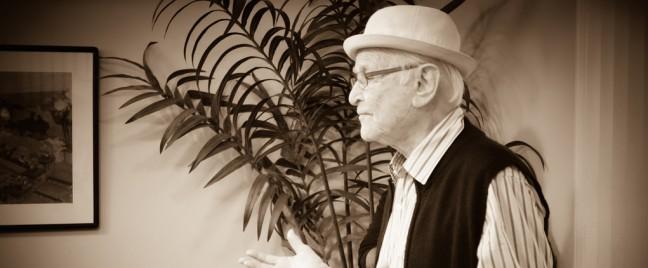Norman Lear single-handedly redefined the television sitcom.
A medium previously rife with whitewashed, squeaky clean depictions of heteronormative, conformist life, the Norman Lear sitcom refused to settle for producing TV people wanted to see.
With his signature white hat, gentle demeanor and passion for telling not one, but many stories of the American human condition, Lear has gone places few have gone before in the pursuit to not only shape television, but to influence what audiences expect from television.
Lear’s extensive career introduced the representation of feminism, blackness and other perspectives not normally included in the discourse of popular narrative television. It is these themes that comprise the premise of “Norman Lear: Just Another Version of You,” a 90-minute documentary accounting the life of one of TV’s original show runners.
The documentary opens with a figurative, child embodiment of Lear as he takes a brightly lit stage in an empty auditorium. It doesn’t necessarily add much to the account, but it’s an artistic choice. The sequence then cuts to Lear warmly embracing Amy Poehler.
The two then form a panel. The moderator asks Poehler questions about how Lear’s work has affected her.
“My son’s name is Archie,” she said.
The next hour and 25 minutes are similar in appreciation and expressions of gratitude for the honesty of Lear’s work, but with finesse, style and saliency that paint the colorful picture of his life.
George Clooney, Phil Rosenthal, Jon Stewart, Lena Dunham, Carl and Rob Reiner and countless others offer their thoughts on Lear’s influence on television as it was once known and how with his intuition, compassion and desire the sitcom forever changed.
Directors Heidi Ewing and Rachel Grady do not look past the conflicts Lear has encountered in his endeavors. A decent chunk of the documentary details Lear’s often patronizing, appropriated perspective on black culture. Lear’s “Good Times,” a spin-off of the hugely successful “Maude,” led to Black Panther activists storming Lear’s office, an incident Lear said changed his perspective on marginalized groups in the United States.
The directors capture a look of reflection and genuineness that fills the 93-year-old’s face. This event resulted in “The Jeffersons,” which, since its 11th season concluded in 1985, has been championed by various entities for featuring a black family as not defined by ebonics and a place in the working place, but capable of living the American dream.
Lear certainly received flack for not being as socially conscious as someone as liberal as he should be, but Lear has since flexed his liberal muscles, heading up various social causes, particularly in the ’80s against Reagan’s New Right.
He ruminates on his familial history at several points in the documentary. His father, a criminal, was absent in his life, with which he has gradually come to terms. He’s divorced, his first wife unable to deal with his intense, prolonged writing schedules. But he finds solace in the relationship he had with his mother and his large family — both with his former and current spouse.
Though at times it feels as such, “Just Another Version of You” does not try to idolize Lear for his significant contributions to television. It simply catches him during his later years, with much ruminating and people to discuss.
Ewing and Grady tout dazzling cinematography and feature both classic Lear, as in the opening credits to “All in the Family,” and more obscure parts of his career, such as Lear’s work as a production assistant on the Colgate Comedy Hour in the early 1950s.
Perhaps it’s the glow he emanates. Maybe it’s the way the film captures how he fits in the world. Or maybe it’s his gift, while occasionally flawed, to unify people from all walks of life as seen in each of his powerhouse network sitcoms. Despite his lengthy career, Lear is not old, as the narrative suggests — the last scene finds him in a room of writers, working on his next pilot.
The talented direction, interesting subject matter and quality celebrity commentary coupled with several moments of truly awe-inspiring revelation of just how much his work has permeated the zeitgeist, regardless of his spotted past, make “Norman Lear” one of this year’s best movies at the Wisconsin Film Festival.


